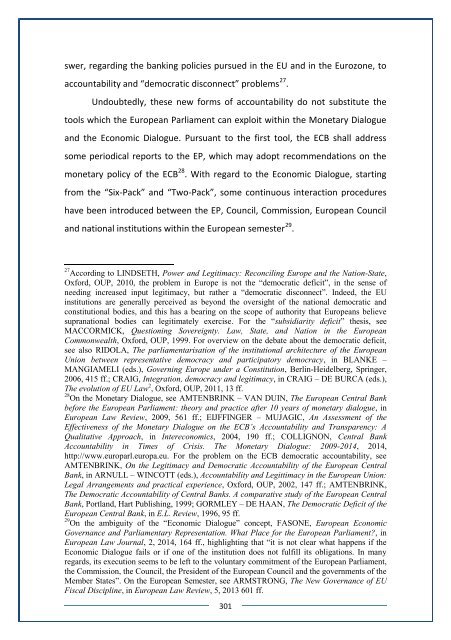ECONOMICS YEARLY REVIEW
Law_and_Economics_Yearly_Review_LEYR_Journal_vol_4_part_2_2015
Law_and_Economics_Yearly_Review_LEYR_Journal_vol_4_part_2_2015
Create successful ePaper yourself
Turn your PDF publications into a flip-book with our unique Google optimized e-Paper software.
swer, regarding the banking policies pursued in the EU and in the Eurozone, to<br />
accountability and “democratic disconnect” problems 27 .<br />
Undoubtedly, these new forms of accountability do not substitute the<br />
tools which the European Parliament can exploit within the Monetary Dialogue<br />
and the Economic Dialogue. Pursuant to the first tool, the ECB shall address<br />
some periodical reports to the EP, which may adopt recommendations on the<br />
monetary policy of the ECB 28 . With regard to the Economic Dialogue, starting<br />
from the “Six-Pack” and “Two-Pack”, some continuous interaction procedures<br />
have been introduced between the EP, Council, Commission, European Council<br />
and national institutions within the European semester 29 .<br />
27 According to LINDSETH, Power and Legitimacy: Reconciling Europe and the Nation-State,<br />
Oxford, OUP, 2010, the problem in Europe is not the “democratic deficit”, in the sense of<br />
needing increased input legitimacy, but rather a “democratic disconnect”. Indeed, the EU<br />
institutions are generally perceived as beyond the oversight of the national democratic and<br />
constitutional bodies, and this has a bearing on the scope of authority that Europeans believe<br />
supranational bodies can legitimately exercise. For the “subsidiarity deficit” thesis, see<br />
MACCORMICK, Questioning Sovereignty. Law, State, and Nation in the European<br />
Commonwealth, Oxford, OUP, 1999. For overview on the debate about the democratic deficit,<br />
see also RIDOLA, The parliamentarisation of the institutional architecture of the European<br />
Union between representative democracy and participatory democracy, in BLANKE –<br />
MANGIAMELI (eds.), Governing Europe under a Constitution, Berlin-Heidelberg, Springer,<br />
2006, 415 ff.; CRAIG, Integration, democracy and legitimacy, in CRAIG – DE BURCA (eds.),<br />
The evolution of EU Law 2 , Oxford, OUP, 2011, 13 ff.<br />
28 On the Monetary Dialogue, see AMTENBRINK – VAN DUIN, The European Central Bank<br />
before the European Parliament: theory and practice after 10 years of monetary dialogue, in<br />
European Law Review, 2009, 561 ff.; EIJFFINGER – MUJAGIC, An Assessment of the<br />
Effectiveness of the Monetary Dialogue on the ECB’s Accountability and Transparency: A<br />
Qualitative Approach, in Intereconomics, 2004, 190 ff.; COLLIGNON, Central Bank<br />
Accountability in Times of Crisis. The Monetary Dialogue: 2009-2014, 2014,<br />
http://www.europarl.europa.eu. For the problem on the ECB democratic accountability, see<br />
AMTENBRINK, On the Legitimacy and Democratic Accountability of the European Central<br />
Bank, in ARNULL – WINCOTT (eds.), Accountability and Legittimacy in the European Union:<br />
Legal Arrangements and practical experience, Oxford, OUP, 2002, 147 ff.; AMTENBRINK,<br />
The Democratic Accountability of Central Banks. A comparative study of the European Central<br />
Bank, Portland, Hart Publishing, 1999; GORMLEY – DE HAAN, The Democratic Deficit of the<br />
European Central Bank, in E.L. Review, 1996, 95 ff.<br />
29 On the ambiguity of the “Economic Dialogue” concept, FASONE, European Economic<br />
Governance and Parliamentary Representation. What Place for the European Parliament?, in<br />
European Law Journal, 2, 2014, 164 ff., highlighting that “it is not clear what happens if the<br />
Economic Dialogue fails or if one of the institution does not fulfill its obligations. In many<br />
regards, its execution seems to be left to the voluntary commitment of the European Parliament,<br />
the Commission, the Council, the President of the European Council and the governments of the<br />
Member States”. On the European Semester, see ARMSTRONG, The New Governance of EU<br />
Fiscal Discipline, in European Law Review, 5, 2013 601 ff.<br />
301


